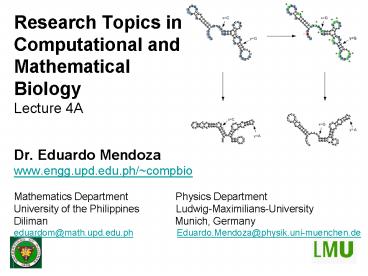Research Topics in
1 / 27
Title: Research Topics in
1
- Research Topics in
- Computational and
- Mathematical
- Biology
- Lecture 4A
- Dr. Eduardo Mendoza
- www.engg.upd.edu.ph/compbio
- Mathematics Department Physics
Department - University of the Philippines
Ludwig-Maximilians-University - Diliman Munich, Germany
- eduardom_at_math.upd.edu.ph
Eduardo.Mendoza_at_physik.uni-muenchen.de
2
Topics to be covered
- What is the topology of shape space?
- Basics of generalized topological spaces
- Closure spaces
- Recombination spaces
- Neighborhood spaces
- Subspaces
- Quotient spaces
- Product Spaces
3
Schultes-Bartel Experiment and neutral networks
- Constructed in vitro LIG-HDV from 2 parent
sequences LIG-P HDV-P (n88, diff catalytic
activities) - LIG-HDV compatible with both associated shapes
(example for Intersection Theorem!) - Independent optimization (thru mutation
selection) yielded sequences LIG-4 and HDV-2 with
full catalytic efficiency of parents (direct
proof of existence of extended neutral networks,
example of an RNA molecule which switches between
two conformations)
4
A picture of the neutral network
5
Review Structure of sequence space
- S(n,A) sequences of length n over the alphabet A
- S(n) S(n,A) with A A,U,G,C
- Similarly for shapes Sh(n,A), Sh(n)
- Hamming graph structure (distance) on S(n,A)
well interpreted as point-wise mutation this is
the well-known hypercube
6
What is the topology of shape space?
- Shape space has been traditionally been seen as
a metric space - Various metrics (or distance) functions have been
defined, However none of these have a clear
biological interpretation (vs. the case in
sequence space) - Starting with work of Fontana-Schuster FOSC98
this metric approach has been seriously
questioned - The work of Stadler et al SSWF01 established a
biologically relevant topological approach based
on the concept of accessibility
7
The concept of accessibility (1)
SSWF01
8
The concept of accessibility (2)
9
Non-symmetry of accessibility
FONT02
10
Accessibility leads to generalized topological
spaces
- Using accessibility to define nearness of
shapes leads even to a more general structure
than a topology - to a pre-topology (if only mutations are
considered as operations in S(n)) - even just to a closure space (or equiv. a
neighborhood space, if recombination is allowed)
11
Closure, Interior and Neighborhood
- We will deal with closely related concepts
12
Axioms for Generalized Topological (GT) Spaces
13
Exercises
- What are the corresponding properties of the int
function for (K0)-(K4)? - Show the equivalence of the formulations of (K2)
for the closure and neighborhood functions
14
Example equivalence of (K4)
15
GT-Terminology
- (X,cl) is
- an isotone space if (K0),(K1) hold
- a neighborhood space if (K0), (K1), (K2) hold
- a pretopological space if (K0), (K1), (K2), (K3)
hold - a topological space if (K0), (K1), (K2), (K3),
(K4) hold
16
Overview of space structures
17
Neighborhoods of sets
18
Continuous functions
19
Biological examples for closure functions
- Mutation on sequence (or genotype) space
- cl (A) set of all mutations that can be
obtained from A in a single step - Homework 1 show that cl defines a pretopology on
S(n), ie, (K0)-(K3) hold
20
2. Recombination functions
21
Recombination Space
(R,cl) in other words is a neighborhood
space. Homework 2. Prove Theorem 1
22
Induced closure function on phenotype sets
23
Subspaces of Neighborhood Spaces
24
Product spaces
25
Quotient Spaces
26
LMUs Old Physics Building workplace for
Planck, Roentgen, Boltzmann, Wien, Sommerfeld,
von Laue, Gerlach, Heisenberg, Binnig,
Lets have a break!
27
References































